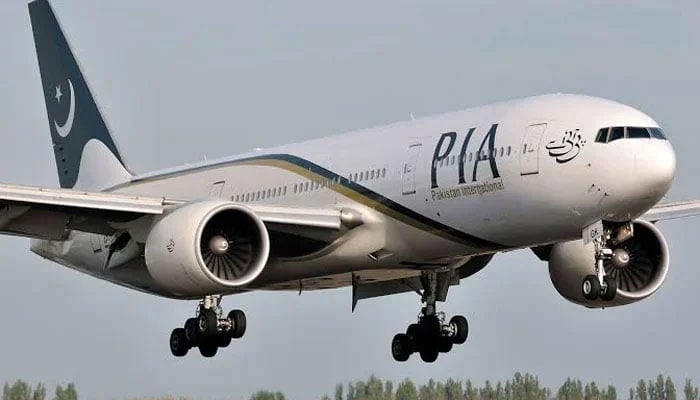10 parties express interest in buying stakes in PIA
Arif Habib has reportedly submitted a Letter of Interest (LoI) to bid for the stake sale of state-owned Pakistan International Airlines
ISLAMABAD: In a significant development regarding the privatization of Pakistan International Airlines (PIA), the government revealed Thursday initial documentation has been completed by 10 major parties, expressing their keen interest in the process. These interested parties also include three private airlines currently operating in Pakistan.
This announcement came during a media briefing by Abdul Aleem Khan, Federal Minister for Privatization, Investment Board, and Transport. He said that these parties are also making consortiums with local and also some foreign partners.
Khan further announced that the Privatization Commission has extended the deadline for submission of Letters of Intent (LoIs) in the PIA privatization by 15 days. Consequently, the Privatization Commission Board on Thursday also extended the date. Interested parties now have until May 18 to submit their LoIs for consideration, earlier the date was May 3. He emphasized that there will be no further extension beyond this date.
Meanwhile, according to Bloomberg, Arif Habib has reportedly submitted a Letter of Interest (LoI) to bid for the stake sale of state-owned Pakistan International Airlines (PIA). The media conglomerate also reported that Akram Wali Muhammad, the Managing Director of Gerry’s Group, has submitted an initial bid.
Addressing concerns about inaccuracies in reporting on PIA’s privatization, Khan assured that the situation was promising. He stressed that PIA still holds immense potential, especially with the addition of new aircraft, potentially transforming it into a profitable entity. Khan highlighted the importance of privatizing PIA, citing the substantial losses incurred by the airline, estimated at 830 billion rupees, and asserted that privatization would serve the nation’s interests.
In response to a statement by PPP Chairman Bilawal Bhutto Zardari opposing privatization, Abdul Aleem Khan said that Bilawal Bhutto and the PPP love Pakistan, and he will meet the PPP chairman to convince him.
Khan mentioned that the government will save billions of losses from government institutions by privatizing them and suggested that this money could be spent on welfare projects.
Khan lamented the economic drain caused by such institutions, emphasizing that it is not the government’s role to conduct business or manage enterprises. He stressed the importance of involving the private sector to modernize and expedite the transformation of these institutions into profitable ventures.
Furthermore, Khan disclosed that other entities, including Steel Mill, Discos, First Women Bank, and House Building Finance Corporation, are also undergoing privatization. He assured swift action following government directives in this regard.
Khan underscored the significance of involving the private sector in revitalizing these entities, stating that it was essential to adapt them to modern demands and make them profitable. He reiterated that all obligations of PIA are being fulfilled before privatization, ensuring a lucrative deal.
Responding to questions, Khan expressed the government’s desire to privatize six to seven Discos while emphasizing that three strategic Discos would remain under government control. Regarding PIA’s flights to Saudi Arabia for Hajj and Umrah, he highlighted their profitability and suggested similar arrangements with Europe, America, Canada, and Middle Eastern countries.
Khan also revealed that the 10 renowned companies expressing interest in PIA’s privatization are seeking partnerships with international firms and have requested a two-week extension, which has been approved by the Prime Minister.
Finally, Khan stressed the need for transparency in all privatization processes, committing to ensuring that they are conducted with utmost integrity and meritocracy, thereby preventing any unwarranted criticism.
-
 Sterling K. Brown's Wife Ryan Michelle Bathe Reveals Initial Hesitation Before Taking On New Role
Sterling K. Brown's Wife Ryan Michelle Bathe Reveals Initial Hesitation Before Taking On New Role -
 BAFTA Film Awards Winners: Complete List Of Winners Updating
BAFTA Film Awards Winners: Complete List Of Winners Updating -
 Millie Bobby Brown On Her Desire To Have A Big Brood With Husband Jake Bongiovi
Millie Bobby Brown On Her Desire To Have A Big Brood With Husband Jake Bongiovi -
 Biographer Exposes Aftermath Of Meghan Markle’s Emotional Breakdown
Biographer Exposes Aftermath Of Meghan Markle’s Emotional Breakdown -
 Backstreet Boys Admit Aging Changed Everything Before Shows
Backstreet Boys Admit Aging Changed Everything Before Shows -
 Ryan Coogler Makes Rare Statements About His Impact On 'Black Cinema'
Ryan Coogler Makes Rare Statements About His Impact On 'Black Cinema' -
 Rising Energy Costs Put UK Manufacturing Competitiveness At Risk, Industry Groups Warn
Rising Energy Costs Put UK Manufacturing Competitiveness At Risk, Industry Groups Warn -
 Kate Middleton Makes Glitzy Return To BAFTAs After Cancer Diagnosis
Kate Middleton Makes Glitzy Return To BAFTAs After Cancer Diagnosis -
 NFL Star Rondale Moore Dies Aged 25, Minnesota Vikings Pay Tribute
NFL Star Rondale Moore Dies Aged 25, Minnesota Vikings Pay Tribute -
 Kim Kardashian Makes Huge Career Move Weeks After Going Public With Lewis Hamilton
Kim Kardashian Makes Huge Career Move Weeks After Going Public With Lewis Hamilton -
 Shia LaBeouf Draws Attention For Sweet Reason After Spending Time In Jail Over Brawl Incident Amid Mardi Gras Bash
Shia LaBeouf Draws Attention For Sweet Reason After Spending Time In Jail Over Brawl Incident Amid Mardi Gras Bash -
 Princess Eugenie, Beatrice Receive Strong Warning After Andrew Arrest: 'Zero Tolerance'
Princess Eugenie, Beatrice Receive Strong Warning After Andrew Arrest: 'Zero Tolerance' -
 Rihanna 38th Birthday Detail Breaks The Internet, Featuring Unexpected Huge Item
Rihanna 38th Birthday Detail Breaks The Internet, Featuring Unexpected Huge Item -
 Liza Minnelli Recalls Rare Backstage Memory With Mum Judy Garland In New Memoir
Liza Minnelli Recalls Rare Backstage Memory With Mum Judy Garland In New Memoir -
 Armed Intruder Shot Dead At Trump's Mar-a-Lago Residence: US Secret Service
Armed Intruder Shot Dead At Trump's Mar-a-Lago Residence: US Secret Service -
 Total Lunar Eclipse: What You Need To Know And Where To Watch
Total Lunar Eclipse: What You Need To Know And Where To Watch




